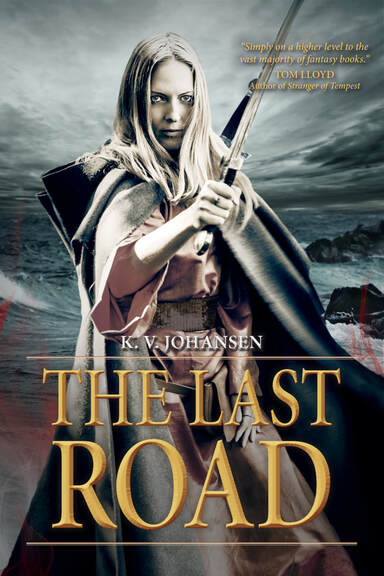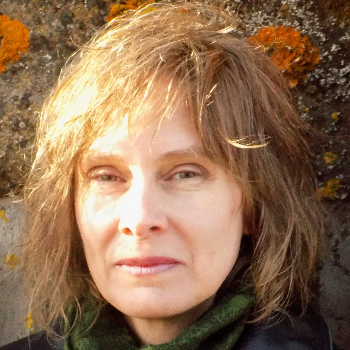 Author K.V. Johansen has a brand-new book available today entitled, The Last Road, and we here at NTG were lucky to sit down with K.V. to discuss her new book and the craft of creative writing. Nerds That Geek: What can you tell us about your new book? K.V. Johansen: The Last Road is the fifth and final book in Gods of the Caravan Road. Although there were three separate stories told over the previous four books, there has also been another story weaving through, that of Moth and her long wandering carrying the black sword Lakkariss. Moth was one of the seven devils “in the days of the first kings in the north” -- they were seven wizards, who bound themselves to seven devils to gain greater knowledge and power, as well as immortality. The nature of the devils and their relationship with the Old Great Gods, who exist outside the world, not part of it the way the gods of the high places and the goddess of the waters are, becomes an important aspect of this book. Moth, since she first appeared in the short story “The Storyteller,” has been wandering with her partner, the half-demon wer-bear Mikki, hunting her fellow devils on behalf of the Old Great Gods -- a bargain she made to gain the sword to avenge her brother and Mikki’s mother on the devil Ogada, but she was less than whole-hearted about having to be the executioner of the remaining five. In The Last Road, although some of the not-entirely-human main characters from the other books, like Holla-Sayan, Yeh-Lin, and Ahjvar and Ghu, have vital and central stories, Moth is much more at the heart of it all than she appeared to be in the earlier books. A new god, the All-Holy, has risen to rule as tyrant over the lands of the west and is sweeping east towards Marakand, conquering and forcibly converting as he comes. Holla-Sayan seems to be lost; Ahjvar recognizes the new god as an old enemy with a particular hatred of Ghu and intends to stop him at Marakand to save his god, his lover, and the land he has given himself to serve, even if it means sacrificing himself; the devil Yeh-Lin, sworn to Ghu’s service, seems to feel likewise, if she can be trusted; and Moth, on whom they were all pinning their hopes, has given up the sword that might have been the only weapon capable of destroying the All-Holy. Reading the proofs, I was struck by how much darker and grimmer it felt than the books that came before. Characters, mortal and immortal alike, are losing hope, seeing the end of their world approaching. But the despair is never total; there is both anger and a grim determination to stand and fight until the end, and love of friends and homes and their gods and life itself keeps the embers of hope alive. NTG: What are you most excited for your readers to experience? KVJ: There are some things with old characters that I’m quite excited about. Ahjvar, in the previous books, has been a badly damaged person, finding his way towards what’s going to be a long, slow healing. The Last Road is almost a couple of hundred years after the end of Gods of Nabban. He and Ghu have grown into one another, become more intertwined, and Ahjvar has really found some peace within himself. We see that in the long flashback that I jokingly described to someone as “In which Ahjvar goes on safari,” where he joins a pilgrim-party travelling in the Nalzawan Commonwealth in order to carry a message for Ghu, and in the present action of the story, where he acquires a follower and is a bit baffled as to how to cope with this young man who goes from having a crush on him to looking for a father-figure. Even more than that, though, I’m really excited for people to see Moth finally showing how very dangerous she was all along. Throughout the series, she has had an inclination to withdraw from engagement with the world, even when doing so meant wrongs she could have prevented were done, but now the one thing that matters to her has been harmed and she’s calmly, coldly, deeply angry. She’s finally woken up and taken fire. NTG: What is it you love the most about creative writing? KVJ: I love making words sing, and I love exploring my people and their landscapes, both the ones they move through and the ones within them. There’s a power in that that’s intoxicating. NTG: What is a unique story that you haven't tackled yet that you'd love to write? KVJ: I have this half-formed thing that’s been trying to shape for a few years now, just a shadow of an idea, that would capture some aspects of things found in folksongs and a certain type of children’s books and ancient myths and medieval legends, that moved me when I was young -- ideas of wanderers, and countryside and wilderness, forgotten heroes and old ancient dark things lurking. It’s not ready yet -- it’s all fog and shadows and scents and echoes. Someday I’ll do it, I hope. NTG: What's next for you after this release? KVJ: There are a couple of things. After I finished The Last Road I wrote a book that had been very alive in my mind for a while, a non-fantasy with a contemporary setting about a gardener and musician, a story about chronic depressive disorder and hope and chasing happiness. I’m shopping that around now; we’ll see what comes of it. The current fantasy project is something I’m just calling “the forest thing” at present: a musician and a shapeshifter enmeshed in a complicated conspiracy of treason, and some very convoluted family entanglements -- and a forest, of course.
0 Comments
Leave a Reply. |
Archives
September 2024
|
|
© 2012-2025, Nerds That Geek LLC.
All Rights Reserved. |
uWeb Hosting by FatCow


 RSS Feed
RSS Feed